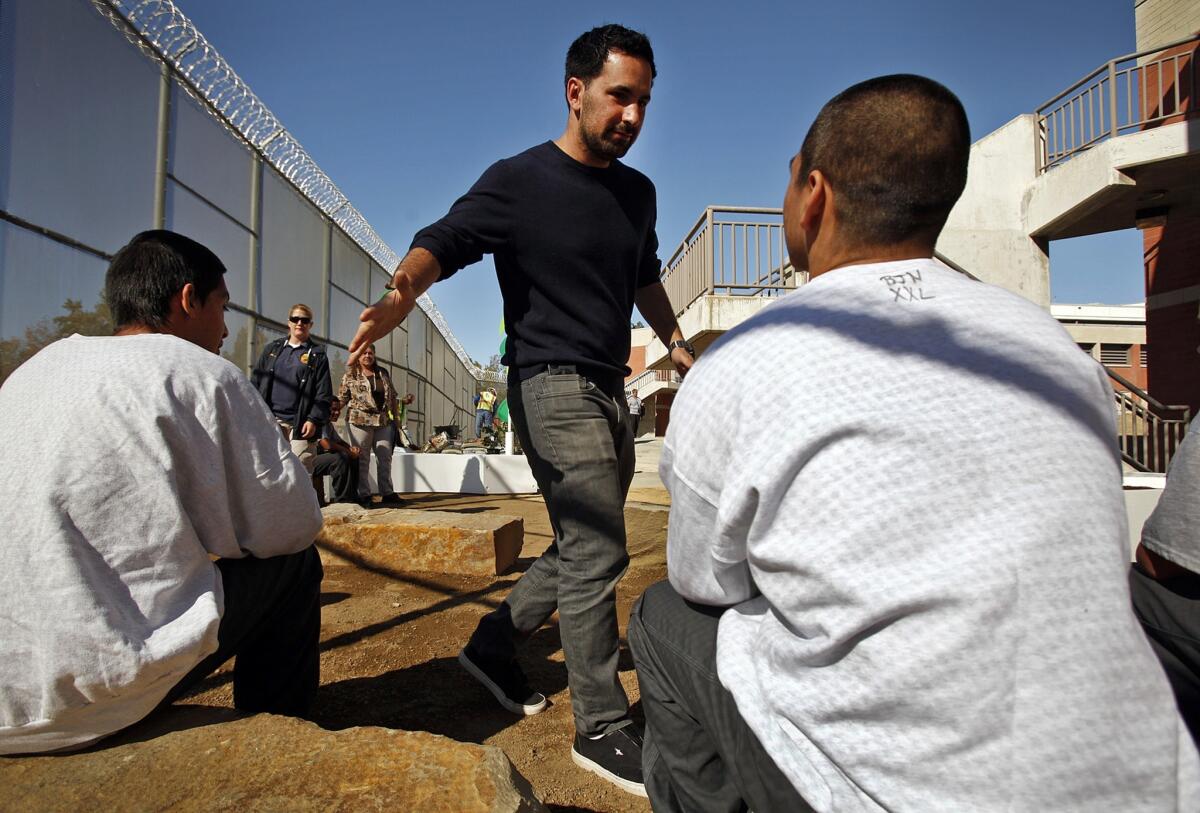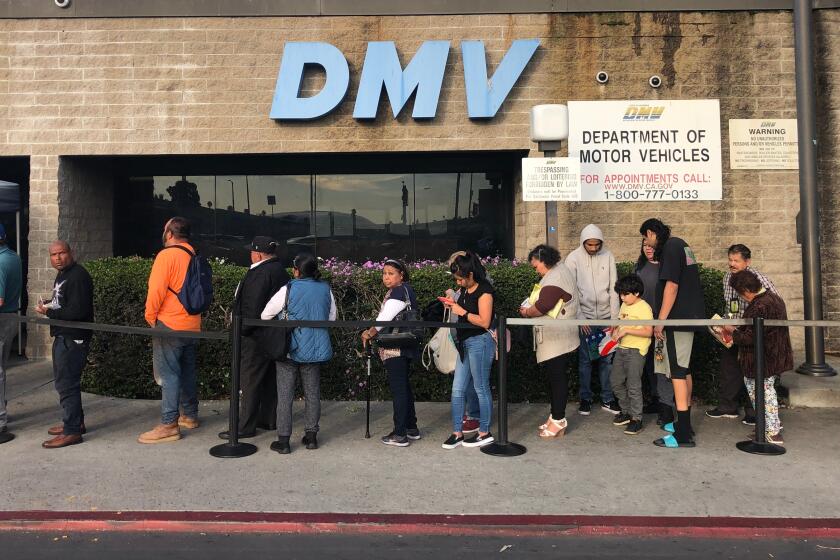‘Hangover’ producer helped a teen convicted in killing. Now he’s under investigation

- Share via
The famous Hollywood producer met Abel Diaz in 2015 in a creative writing class he taught at Sylmar Juvenile Hall. He thought the teenager — accused at 16 of playing a role in the killing of a Downey police officer — was a quick learner with the potential to take college courses while behind bars.
Within days, Scott Budnick, a producer of the “Hangover” movies who is well known for his criminal justice advocacy, became engaged in his defense.
He reached out to several lawyers, and two prominent defense attorneys — Blair Berk and Michael Cavalluzzi — took on the case pro bono.
In a deal brokered with prosecutors in December 2018, Diaz, now 21, admitted his role in the officer’s killing in juvenile court and will be released from detention by age 25. As part of the deal, prosecutors dropped their quest to move Diaz’s case to adult court, where he would have faced a maximum sentence of life in prison without the possibility of parole.
As Diaz’s case came to an end, however, the Los Angeles County sheriff’s homicide sergeant who investigated Diaz launched a criminal probe into Budnick and the two defense attorneys. In a May report, he said he was looking into whether they dissuaded a witness and conspired to obstruct justice, provide false testimony and destroy or conceal evidence.
Sgt. Richard Biddle obtained two search warrants this year, including one ordering Google to turn over Budnick’s emails, location history, internet searches, photographs and passwords tied to his account.
Un productor de ‘The Hangover’ ayudó a un joven acusado de asesinato; ahora es él a quien investigan
El productor y dos abogados que defendieron a un menor inculpado por el asesinato de un agente de policía fueron acusados de mala conducta por un sargento del sheriff del condado de Los Ángeles.
The warrants have sparked a legal battle over whether Biddle’s investigation was a legitimate probe into potential wrongdoing or the result of a vendetta for securing Diaz a favorable outcome. It remains unclear what evidence Biddle provided to secure the warrants, because the affidavits he wrote to a judge are sealed. Budnick’s attorneys filed a motion to make them public.
The Los Angeles Times reviewed Sheriff’s Department reports and affidavits Biddle wrote alleging misconduct by Budnick and the defense attorneys that were attached as exhibits in court filings.
The case involves two well-known Hollywood figures. Budnick, the founder of a support network for current and former inmates called the Anti-Recidivism Coalition, was named volunteer of the year in 2012 by former Gov. Jerry Brown for his work helping inmates get a higher education and has pushed for criminal justice reforms. Former President Obama appointed him to an advisory council to increase opportunities for young men of color.
Berk is one of Hollywood’s top lawyers. She has represented numerous celebrities, including Harvey Weinstein and Felicity Huffman.
Those who know Biddle describe him as a fair and ethical investigator. Deputy Dist. Atty. Michael Blake, who prosecuted Diaz’s case, dismissed suggestions that Biddle’s actions were retaliatory.
Biddle and his partner performed “impeccably and with extreme professionalism,” Blake said. “They’re also very motivated detectives and they pursue things to the end — however they come out.”
The detective declined to comment on the allegations or the status of the criminal investigation into Budnick and the two attorneys. A spokesman for the L.A. County district attorney’s office said no cases involving the trio had been presented to prosecutors.
Budnick’s attorneys described the actions as flagrant government overreach.
“Something very troubling is going on here,” said Alan Jackson, who is representing Budnick. “Our advocates and lawyers should be free to represent their clients without fear of retaliation from law enforcement simply for doing their job. This sort of unjustified attack has a chilling effect on the very justice system we fight to maintain in every courtroom and in every case.”
Through Jackson, the producer declined to comment for this story. Cavalluzzi and Berk also declined to comment because of pending litigation.
The murder investigation stemmed from a series of events in November 2015 that led to the shooting death of Ricardo Galvez, a 29-year-old Downey police officer.
Diaz, who admitted his own culpability in court, wanted some money as his 17th birthday approached and suggested to his two friends that they look for purses to steal, according to a transcript of his admissions.
They spotted a man sitting in his car in a parking lot, distracted by his cellphone, and decided to rob him. Diaz said he covered part of his face with a mask and crept between parked cars so the man wouldn’t see him coming. He said his friend Steven Knott followed.
Diaz tried to open the car‘s passenger-side door, but it was locked. He then heard a gunshot. He and Knott ran to their car, with Knott’s brother Jeremy Alvarez at the wheel, and drove off.
By the next morning, they had all been arrested. Diaz was charged with murder under the felony murder theory, which allowed defendants to be convicted of first-degree murder if a victim dies during the commission of a felony — even if the defendant did not intend to kill or did not know a homicide took place. (Legislation that took effect this year in California limits who can be prosecuted for felony murder. Diaz admitted in juvenile court to one count each of murder, attempted robbery and robbery.)
About two months after Diaz’s arrest, the Downey Police Department received an anonymous letter alleging that Budnick’s offer to find Diaz private lawyers was inappropriate and was done without the knowledge of his public defender.
Biddle’s reports described what he called allegations of potential criminal and unethical conduct by Budnick and Diaz’s legal team.
In one, he accused the defense attorneys of providing false information to the judge handling Diaz’s case and failing to disclose that the producer recruited them. He also accused the attorneys of discouraging Diaz’s relatives from reporting gang threats because it would hurt Diaz’s prosecution.
He included descriptions of Budnick’s role and influence in the criminal justice system, including transcripts of phone calls with incarcerated youth and details about email exchanges he said confirmed Budnick’s political clout with the Probation Department and Sheriff’s Department executives. He wrote that Budnick prepared letters on behalf of young offenders that may contain “inaccurate” or “conflated information” on their educational accomplishments and behavior.
Budnick and the defense attorneys have denied the allegations in court papers. In a declaration, Cavalluzzi called the accusations, including that they conspired to falsify evidence and that he dissuaded a witness from reporting a crime, “outrageous and untrue.” He also wrote that they believed the allegations were primarily an attempt to disrupt their representation of Diaz.
In an affidavit reviewed by The Times, Biddle wrote that he thought the attorneys would try to interfere with a request that Diaz be transferred to an L.A. County jail so he could be called to testify in Knott and Alvarez’s trial, which is pending. He sought to keep the transfer secret from Diaz’s attorneys.
“I also believe Diaz’ prior attorneys and Budnick would attempt to dissuade Diaz and inappropriately advise/convince Diaz to not testify in the prosecution of Knott and Alvarez,” Biddle wrote.
Budnick’s attorneys contend in a court filing that Biddle has gone out of his way to make sure those involved in Diaz’s case know he’s watching them. On a Saturday in October, Budnick was at Starbucks near his home when three deputies approached. One asked if he knew Biddle and handed him a subpoena.
“I know of him, yes,” Budnick said, according to a filing by Budnick’s attorneys.
The deputy then told him that Biddle wanted him to know the subpoena to testify in an unrelated case — that of Roger Ruiz — was from him, the filing said. Ruiz, another inmate Budnick mentors, is accused of assaulting a police officer with a firearm.
Deputy Dist. Atty. Eric Siddall, who is prosecuting Ruiz, disputed that Biddle was attempting to intimidate Budnick with the subpoena, calling the allegation “pure fiction.” He also said he was in touch with Budnick’s attorney a month before the subpoena was served, so it shouldn’t have come as a surprise.
“I asked that Mr. Budnick be served as a witness, not Sgt. Biddle,” Siddall said by email. “The deputy who served the subpoena was professional and friendly and brought up Sgt. Biddle’s name only to contextualize the situation for Mr. Budnick.”
Budnick appeared at the hearing, but was excused after Jackson indicated that his client would invoke his 5th Amendment right to remain silent on the stand because Biddle was in the courtroom.
Biddle’s conduct, the filing said, “is a ham-handed attempt to send a very clear and unambiguous message: Defend those Sergeant Biddle deems prosecution-worthy and the Los Angeles Sheriff’s Department will come after you.”
The Sheriff’s Department did not return requests for comment.
Superior Court Judge Michael Pastor, who authorized Biddle’s search warrants, did not return requests through his clerk for comment. A Superior Court spokeswoman responded instead, saying judges are prohibited from discussing pending cases and maintain a privilege regarding questions about their mental process or motivations.
In addition to the warrant for Budnick’s Google information, Pastor authorized another warrant for Sheriff’s Department and Probation Department emails related to Budnick, Diaz and Cavalluzzi.
It’s unclear exactly what evidence the judge saw when issuing the warrants. But experts said it would be hard to imagine a justification for needing unfettered access to Budnick’s Google account data, especially without specifying a time frame for the information.
“It is hard for me to imagine any universe in which this warrant is not unconstitutionally overbroad,” Rebecca Wexler, a law professor at UC Berkeley who studies the intersection of technology and criminal justice, said by email. “This is very frightening.”
More to Read
Sign up for Essential California
The most important California stories and recommendations in your inbox every morning.
You may occasionally receive promotional content from the Los Angeles Times.











